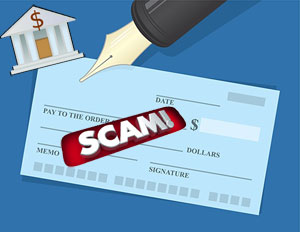CASHIER'S CHECK SCAM
WHAT IS CASHIER'S CHECK SCAM ?
A cashier's check is a type of check issued by a bank or credit union and signed by a cashier or teller. Since the funds are drawn directly from the bank's own reserves, the check cannot bounce. The cashier’s signature serves as a guarantee of payment. You might also receive a cashier's check after closing a deposit account that still has a remaining balance. While cashier's checks are generally considered secure, they can still be targeted by theft or fraud—and dealing with those issues isn’t always easy. Because of their reputation for safety, cashier’s checks have become a common tool used in scams. Whether you're selling something online or in person, it’s important to handle cashier’s checks with extra caution.
A cashier's check is a type of check issued by a bank or credit union and signed by a teller or cashier. Since the funds come directly from the bank’s own reserves, the check cannot bounce. The cashier’s signature acts as a guarantee of payment. You might also receive a cashier’s check when closing a bank account that still has a balance. Although these checks can’t bounce, they’re still vulnerable to risks like theft and fraud—and dealing with those problems isn’t easy. Because cashier’s checks are seen as secure and trustworthy, they’ve become a popular tool in scams. Whether you’re selling something online or in person, it’s important to handle cashier’s checks with extra care.

SAFETY AND CASHIER'S CHECK FRAUD :
Cashier’s checks are considered secure because they provide guaranteed funds when valid. Unlike personal checks, they are less likely to bounce, and the funds are often available within one business day, giving the recipient peace of mind. However, cashier’s checks are not as secure as they once were. You should not assume a cashier’s check is equivalent to cash unless you know and trust the person providing it.
A TYPICAL CASHIER'S CHECK SCAM :
The most common cashier’s check scam typically unfolds like this: A “buyer” expresses interest in purchasing an item and offers to pay using a cashier’s check. For some reason, the check is issued for an amount greater than the agreed-upon purchase price. The buyer then urges the seller to “just go ahead” and deposit the check. Afterward, the buyer requests that the seller return the excess amount—usually in cash or via wire transfer—either directly to them or to a third party.

NOTE THE KEY ELEMENTS :
The buyer uses a cashier’s check or money order and explains that this is their only available payment option.
-
The seller or recipient receives a check for more than the agreed amount.
-
The seller is then asked to return the excess funds to the buyer or to a supposed "helper."
-
If you're faced with a situation like this, you're almost certainly dealing with a scammer.
TIMING IS ESSENTIAL: Do not send any money or merchandise until you are 100% certain that the paying bank has actually transferred the funds. This is often referred to as the time when the check "clears," but that term can be misleading—even for bank employees.
Funds from a cashier’s check may be available for withdrawal within one business day. However, that does not guarantee the funds actually exist or have been transferred to your bank. The clearing process can take several business days or longer. The less you know about the buyer, the longer you should wait.
HOW CASHIER'S CHECK BOUNCE ?
Many people believe that cashier’s checks are secure, which is exactly what makes these scams so effective. If you spend the funds—such as by sending money to a “shipper”—you may have to reimburse the amount later. Once your bank realizes the check is fake, the deposit will be reversed, potentially leaving you with a negative account balance. This could cause your other checks to bounce and prevent you from making important payments. Victims of these scams often lose hundreds or even thousands of dollars.
PROTECT YOURSELF :
? Never accept a check for more than the agreed amount.
? If possible, go to the bank with the person paying you and watch the cashier’s check being issued by a teller.
? Verify the funds on any check or money order you receive.
? Insist on more reliable forms of payment, such as a wire transfer—but be cautious about sharing your bank account information.
? Only deal with local buyers on Craigslist and similar platforms, and insist on cash payments if you can't visit the bank together.
? Inspect every check carefully. Look for signs it may be fake, such as misspelled words or poor-quality paper without security features.
? If you must accept a check for more than the asking price, inform the buyer that you will wait at least two weeks before sending any money or merchandise.
? Speak with a bank manager when depositing suspicious checks. Explain the situation and ask when you can be absolutely sure the funds are valid.
? When in doubt, don’t accept questionable checks—it’s safer to walk away than become a scam victim.
MORE EXAMPLES :
Cashier’s checks are commonly used in various scams. Be alert for situations like the one below:
-
Money Mule – You receive payments and are instructed to deposit them into your bank account, then forward the funds to someone else. This setup is often disguised as a work-from-home “check processing” job, but it’s usually part of a scam.
In some cases, you’re unknowingly laundering money for criminals. In others, the first few checks may clear—gaining your trust—before you're sent a fake one, leaving you responsible for the loss.

-
Foreign Wealth Scams – A stranger contacts you asking for help in moving a large sum of money out of a corrupt country. In return, you’re promised a small portion of the transfer—often more money than you earn in a year. But to complete the transaction, you must first send money to another party. That’s when the scam takes its toll.
-
Inheritance and Lottery Scams – You’ve “won” a huge inheritance or lottery prize! But before you can receive the money, you're asked to pay a small fee for taxes or legal costs to “release” the funds. It may seem like a small price to pay for a big reward—but the payout never comes.
Property Rental Scam – Someone claims they’re relocating to your area for a new job and wants to rent your property. They offer to pay the security deposit, first and last month’s rent, and additional fees using a cashier’s check—even though they’ve never seen the property. The day after you deposit the check, they claim there was an issue with the job and they no longer need the rental. They ask you to refund part of the rent, allowing you to keep the security deposit. After you send the refund, you later discover the check was a fake.
Feel Free to use our Spam Checker Tool
report scams to the United States government—file a complaint about a scam or any other crime here.



